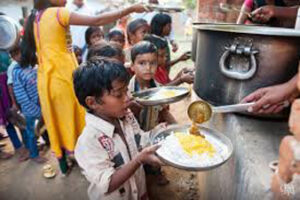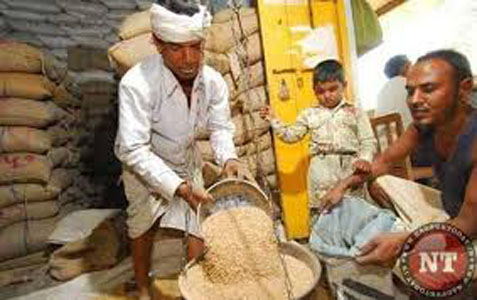AHMEDABAD, JUNE 25
Despite the best efforts of the government and the NGOs, food security for the targeted group remains a challenge during the lockdown owing to the pandemic COVID-19. Most of the needy could not obtain free ration kits from the public distribution system (PDS). This can be addressed only by more active government intervention in hunger relief efforts across the country, says a survey.

A survey of over 100 organisations and individuals describes a diversity of civil society efforts targeting food scarcity during the Covid-19 lockdown and the challenges they have faced. The survey includes responses from individuals and organisations that are/were facilitating the distribution of food and raw materials to those facing acute shortages across different parts of the country. Despite the continued need and demand for such efforts, the survey points to the fact that most of them do not have resources to continue. The results bring out the need for more active government intervention in hunger relief efforts across the country.
The research report prepared by a team of researchers at IIM Ahmedabad led by Prof. Ankur Sarin (Faculty), research associates Bianca Shah, Ishu Gupta Karan Singhal, Shraddha Upadhyay, and Vaidehi Parameswaran (Research Intern). They were assisted by Shriya Singh (Research Intern, IIM Ahmedabad) and Shailesh Christian (Sahyog Trust) in data collection. Former faculty Prof. Reetika Khera and former alumni Sandeep Sachdeva have offered valuable inputs.
KEY FINDINGS:
1. Organisations and collectives of various sizes and sectors have launched efforts in diverse ways to address the grave hunger and food scarcity problem across the country. Civil Society Organisations (CSOs) and individuals have been undertaking relief efforts in a wide variety of ways and have responded to the needs of the public.
2. The efforts have been essential despite the PDS, because of issues of shortages, poor quality, and lack of access. While less than 20% of efforts stated that none of the people there were serving had accessed the PDS, almost half the respondents stated that only some people have obtained rations. This points both to the potential of the PDS in being able to reach large populations, but places for improvement.
3. Civil society efforts are characterized by a high degree of community engagement. The results suggest that CSOs have tried to meet the diverse needs of communities, develop innovative solutions and expand their outreach in areas that are generally less accessible. Almost 91% of respondents reported that communities were involved in their efforts in some capacity.
4. Initiatives have operated despite almost no financial support from governments: Most respondents reported that support from governments have been limited to providing approvals for curfew passes and identification of areas with people in need of food. Aid in the form of funding and raw materials has been negligible. Less than 4% of respondents have received monetary support.
5. Insufficient funding remains an obstacle to continued hunger relief efforts of these organisations/individuals: More than 87% of respondents claimed that funding is their primary source of concern and it might compel them to suspend operations. Almost 36% had halted distribution activities at the time of the survey.
KEY SUGGESTIONS:
1. At a time when food is scarce at the household level but not at the country level, the universalisation of the PDS is going to be essential to reduce hunger as resources among independent efforts fast deplete.
2. Better coordination between the government and civil society at both the level of policy formulation and ground level implementation is essential for strengthening efforts. For instance, although NGOs were allowed to buy grains from FCI godowns, very few respondents report actually being able to utilize it because of the processes and requirements in addition to concerns about quality. Likewise, familiarity of local organisations with vulnerable communities can help reach rations via government programs designed to go beyond PDS holders.
3. It would be essential for local governments to think creatively about reaching food to households in containment zones, where logistics of food distribution continue to be a challenge in containment zones. This includes trying to utilize and compensate those engaged in regular distribution of goods and services in those localities – like postal services, electricity bills collectors, couriers – with adequate personal protective equipment.
4. NGOs that have a track record of working with particularly vulnerable communities, like sex workers, single women headed households, senior citizen should be immediately assisted by the government. The organisations should be given the autonomy to design and implement programs most suitable for the particular community.
Also raed: India joins ‘Alliance for Poverty Eradication’ at UN as founding member












